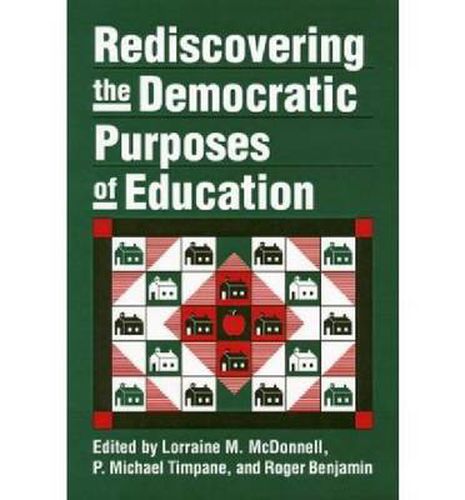Readings Newsletter
Become a Readings Member to make your shopping experience even easier.
Sign in or sign up for free!
You’re not far away from qualifying for FREE standard shipping within Australia
You’ve qualified for FREE standard shipping within Australia
The cart is loading…






This title is printed to order. This book may have been self-published. If so, we cannot guarantee the quality of the content. In the main most books will have gone through the editing process however some may not. We therefore suggest that you be aware of this before ordering this book. If in doubt check either the author or publisher’s details as we are unable to accept any returns unless they are faulty. Please contact us if you have any questions.
Why do America’s public schools seem unable to meet today’s social challenges? As competing interest groups vie over issues like funding and curricula, we seem to have lost sight of the democratic purposes originally intended for public education. Public schools were envisioned by the Founders as democratically run institutions for instilling civic values, but today’s education system seems more concerned with producing good employees than good citizens. Meanwhile, our country’s diversity has eroded consensus about citizenship, and the professionalization of educators has diminished public involvement in schools. This volume seeks to demonstrate that the democratic purposes of education are not outmoded ideas but can continue to be driving forces in public education. Nine original articles by some of today’s leading education theorists cut a broad swath across the political spectrum to examine how those democratic purposes might be redefined and revived. It both establishes the intellectual foundation for revitalizing American schools and offers concrete ideas for how the educational process can be made more democratic. The authors make a case for better empirical research about the politics of education in order to both reconnect schools to their communities and help educators instill citizenship. An initial series of articles reexamines the original premise of American education as articulated by important thinkers like Jefferson and Dewey. A second group identifies flaws in how schools are currently governed and offers models for change. A final section analyzes the value conflicts posed by the twin strands of democratic socialization and governance, and their implications for education policy. Spanning philosophy, history, sociology, and political science, this book brings together the best current thinking about the specifics of education policy–vouchers, charter schools, national testing–and about the role of deliberation in a democracy. It offers a cogent alternative to the exchange paradigm and shows how much more needs to be understood about an issue so vital to America’s future.
$9.00 standard shipping within Australia
FREE standard shipping within Australia for orders over $100.00
Express & International shipping calculated at checkout
This title is printed to order. This book may have been self-published. If so, we cannot guarantee the quality of the content. In the main most books will have gone through the editing process however some may not. We therefore suggest that you be aware of this before ordering this book. If in doubt check either the author or publisher’s details as we are unable to accept any returns unless they are faulty. Please contact us if you have any questions.
Why do America’s public schools seem unable to meet today’s social challenges? As competing interest groups vie over issues like funding and curricula, we seem to have lost sight of the democratic purposes originally intended for public education. Public schools were envisioned by the Founders as democratically run institutions for instilling civic values, but today’s education system seems more concerned with producing good employees than good citizens. Meanwhile, our country’s diversity has eroded consensus about citizenship, and the professionalization of educators has diminished public involvement in schools. This volume seeks to demonstrate that the democratic purposes of education are not outmoded ideas but can continue to be driving forces in public education. Nine original articles by some of today’s leading education theorists cut a broad swath across the political spectrum to examine how those democratic purposes might be redefined and revived. It both establishes the intellectual foundation for revitalizing American schools and offers concrete ideas for how the educational process can be made more democratic. The authors make a case for better empirical research about the politics of education in order to both reconnect schools to their communities and help educators instill citizenship. An initial series of articles reexamines the original premise of American education as articulated by important thinkers like Jefferson and Dewey. A second group identifies flaws in how schools are currently governed and offers models for change. A final section analyzes the value conflicts posed by the twin strands of democratic socialization and governance, and their implications for education policy. Spanning philosophy, history, sociology, and political science, this book brings together the best current thinking about the specifics of education policy–vouchers, charter schools, national testing–and about the role of deliberation in a democracy. It offers a cogent alternative to the exchange paradigm and shows how much more needs to be understood about an issue so vital to America’s future.